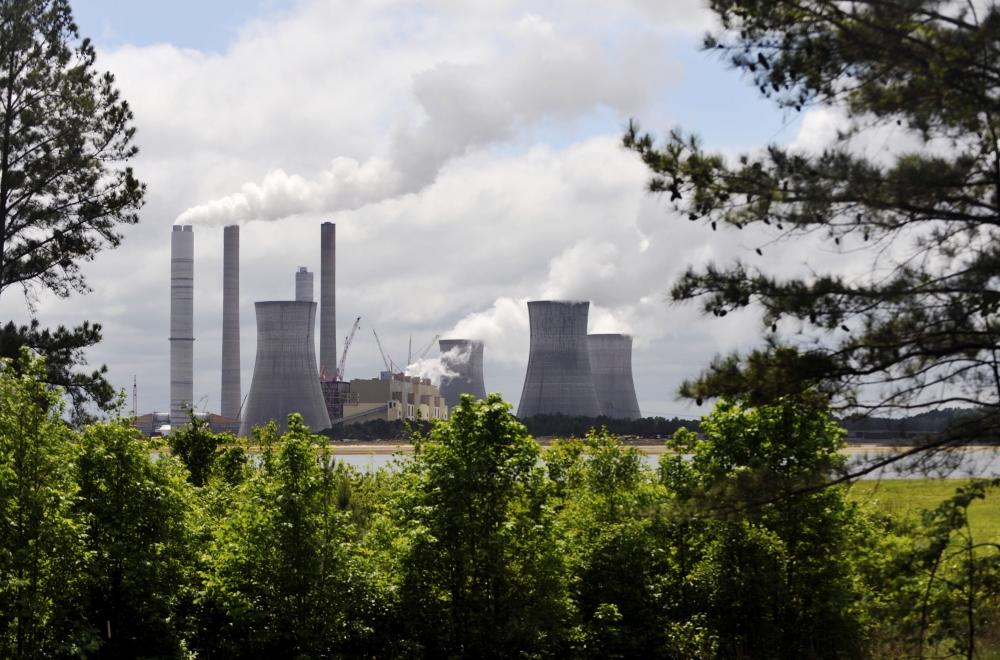
Caption
Georgia Power’s Plant Scherer, a coal-fired power plant. Coal plants are among the facilities that would no longer be permitted unlimited emissions at startup and shutdown if Georgia implements federal regulations.
Credit: File

Georgia Power’s Plant Scherer, a coal-fired power plant. Coal plants are among the facilities that would no longer be permitted unlimited emissions at startup and shutdown if Georgia implements federal regulations.
Under pressure from the federal government, Georgia is rewriting a rule governing industrial air pollution limits to end a loophole that currently exposes communities near coal plants and other facilities to harmful pollutants.
Federal rules strictly govern the amount of dangerous pollutants coal-fired power plants and other industrial facilities can emit into the air — but an exception to these emissions limits has long been carved out for periods when an industrial boiler is starting up, shutting down, or malfunctioning.
In 2015, a lawsuit by the Sierra Club forced the federal Environmental Protection Agency to close this loophole.
The EPA instructed 36 states, including Georgia, to revise their environmental regulations to apply consistent emissions standards across the board, and gave them a deadline of November 2016 to submit plans to do so.
Eight years later, Georgia still hasn’t rewritten its state regulations accordingly and power plants remain permitted during startup and shutdown periods to emit unlimited pollutants into the air, potentially causing health hazards to nearby communities.
This week, the chief of the Georgia Environmental Protection Division’s Air Branch presented a new plan before a Department of Natural Resources board meeting in Macon for how the state can comply with the federal rule.
The proposal mirrors an earlier version of the plan that the EPA rejected last year in that it allows polluters to submit “alternative emissions limitations” for periods of startup, shutdown, and malfunction (SSM in regulatory jargon) for approval by state regulators, said Karen Hays, the Air Branch chief. The new version, though, would also require approval by EPA in addition to the EPD for such exemptions.
The alternative limitations could take the form of “work practices” rather than a numerical cap on the amount emitted. As an example, Hays told the Telegraph, an industrial facility whose process involves two fuels might commit to only burning the cleaner of the two fuels at startup.
The previous proposal was withdrawn in January after the EPA said it violated its interpretation of the Clean Air Act. In its notice rejecting Georgia’s plan, the EPA said the proposed rules “seem to have been developed without consideration of whether sources are capable of complying with otherwise applicable numeric emission limitations.”
While the EPD has not yet officially submitted its new proposal to the EPA, Hays said, “informally, they’ve approved the concept that emission limits will apply at all times, but during these startup, shutdown, and malfunction events, they can approve some kind of alternative limit.”
The main difference between the new proposed rule and the one that the EPA rejected last year, Hays said, is that the alternative limitations would need to be approved by federal as well as state regulators.
Hays, who is retiring from the EPD on May 1, downplayed the significance of the rule change, saying, “I think the impact of this change is going to be nothing.”
She said excess emissions events of the kind under consideration are “very rare, and they’re very short when they occur.”
But environmental advocates say that’s no reason to give polluters a free pass at SSM periods.
At some coal plants, during periods of startup and shutdown, “the smell is unbearable and the air quality really becomes dangerous, because those periods are basically the periods that EPA and the states should be planning for and protecting the public from,” said Isabella Ariza, a Sierra Club attorney.
What’s more, periods of startup and shutdown are increasingly common at coal plants, as their growing operational cost has meant they are frequently only used for periods of peak energy demand — so they’re brought online and turned off more often.
Traditionally, “coal plants were always baseload; they ran them wide open year round. Now they’re running them a few weeks at a time,” said Mark Woodall, the Georgia Sierra Club’s legislative chair.
Since it has not yet been formally submitted, The Telegraph has not reviewed the new proposed rule.
The earliest that the new EPD rule could be submitted for federal review is after the Department of Resources’ August board meeting, when the agency could approve the rule after soliciting public comment.
But this may not be soon enough to avoid litigation over how long the process has taken. On March 3, the Sierra Club issued a notice informing the EPA of its intent to sue the agency within the next 60 days for taking years longer than was legally required to officially recognize that Georgia had not submitted the proposed rule.
This story comes to Georgia Public Broadcasting through a reporting partnership with The Ledger-Inquirer.